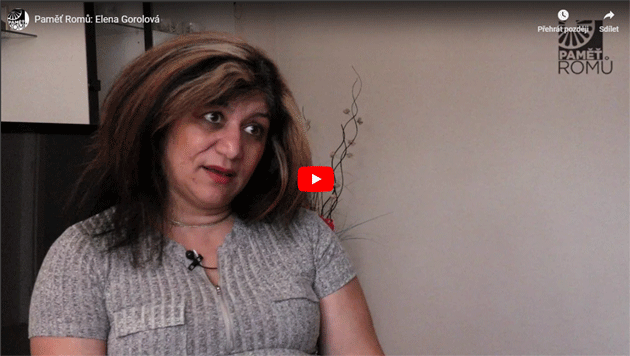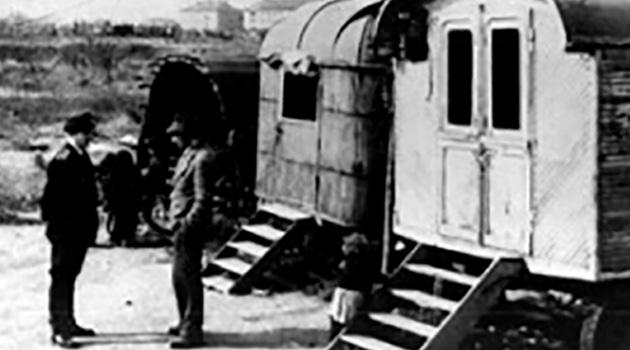Romani activist Elena Gorolová is one of 100 Inspiring Women on the BBC's list for 2018

Yesterday the British Broadcasting Corporation (BBC) published its 2018 list of the world’s 100 most inspiring women. Elena Gorolová, who has been fighting for many years for the rights of women who have been forcibly sterilized, and who herself was sterilized without her informed consent as a young woman, is on the list for 2018.
The BBC has published the list since 2013 and features women of all age categories from different walks of life. The list features leadership figures, women contributing innovative approaches to their fields, and everyday heroines.
Elena Gorolová captured the attention of the BBC above all for her tireless fight against forced sterilization, which according to her is far from over, although much has been achieved: “We are still fighting because we have not reached the end yet, we have not been compensated, we have not achieved all that we set out to do in the beginning. We have already, for example, achieved an apology. We have already achieved the fact that they are no longer performing the sterilizations they way they performed them on us, women today have the opportunity, for about a month or three weeks before the operation, to make their decision about such a procedure, including together with their family, with their husband. That exists because we spoke up. If we had never spoken up, then they might still be performing the kinds of interventions that they performed on us. In my opinion, we have a lot of work behind us.”
Ms Gorolová comes from Ostrava in the Czech Republic. At the age of 21, after she gave birth to her second child, she was forcibly sterilized.
She refused to accept her fate and decided to fight back, even though in the beginning she encountered a total lack of comprehension: “My husband and I went to the authorities and the lady there said to me: ‘Get out!’ She did not want to speak with me about it, she did not want to listen to me at all, she threw me out. After that I didn’t try to go anywhere else, because that experience stayed with me.”
However, she was called back to the struggle by meeting with other Romani women who had been subjected to the same kind of intervention: “I read that some women were meeting at the association, and these [forced] sterilizations started to be discussed. I said to myself: ‘All right, I can do that too… I’ll go there.’ So I got myself together and went to Life Together, to their counseling center in particular. I had been waiting my entire life for something like that, wanting to do something about it.”
Ms Gorolová was one of a very few woman who had been afflicted by this treatment who was not afraid to speak about her trauma in public, and as a result she came to the forefront of the group: “Later the women during one of the meetings said they wanted it to be me who would convene the meetings, who would basically also communicate more with the media, with the television crews and such. The women had concerns, they didn’t want to communicate in that way, but I wanted to shout it out loud immediately to the entire world, because I did not have any such concerns and I wanted to communicate this to people so we basically would be able to do something about it.”
She also had the good luck to have the support of her husband in her struggle, despite his initial distrust of the situation: “There were some moments when basically my husband and I had problems, because if he had something to drink, then he would accuse me of having wanted the sterilization. He reproached me for it before he finally comprehended what it was about. Because it’s also embarrassing – whenever he went out somewhere the guys would ask him about it and what was he supposed to say? In the Romani community this is discrediting. He would say “They did it to my wife,” but some people never did understand this. When I met later with the other women, I learned that their men had abandoned them, left them, because they were ashamed – they wanted to have children. My husband later comprehended everything, though, so he aided me with the struggle.”
However, not all was success – her high degree of commitment over time left its mark on the state of her health: “During the time that I have been working it has not always been easy on my health, because after a while I broke down. I collapsed to such a degree that I stayed in bed for half a year. Basically my family had to take care of me and our children for the six months I was bedridden. My own mother had to come over every day to cook for me, they didn’t know what was happening to me, because I didn’t want to live anymore, I didn’t want to do anything, the light had gone out of everything for me. Basically it was because I had taken on too much. Because before I began working I had also started going back to school – so I was working, running the household, dealing with the media, the television, even on Saturday and Sunday, my organism just collapsed.”
Despite all of the difficulties that Ms Gorolová has had to face, she still takes a detached view of life: “I cannot complain, I have a good life. I have a good husband, my life is good – the children are good, obedient, and I have beloved parents. Basically all I am wishing for is that little girl [I was prevented from having], for us to have a grandchild – and we’ll see how that goes. It is always difficult, though, because it is terribly hard when one recalls it all, that one was 21 years old and suddenly it’s all over. When I see that my son is about to be 29 and doesn’t have a child yet, I say to myself: ‘Jesus, I was so young, just 21, and already I had two children – and then no more.’ It really hurts me, it pains me, but I’m glad to have the children I do.”
ROMEA filmed an interview with Elena Gorolová about her life story as part of the Memory of the Roma oral history project. The full interview is here.
